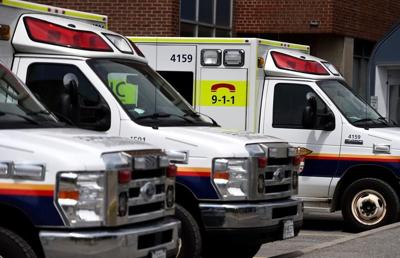On a recent day in the County of Essex in southwestern Ontario, there were no ambulances available to respond to emergencies for almost three hours as 26 paramedic teams were delayed at hospitals, highlighting an "unsustainable" issue seen provincewide, officials said Monday.
The county declared a local emergency Monday due to long — and increasing — waits for ambulances to offload patients at hospitals, which means they are unavailable to go on other calls.
Last Wednesday, Essex-Windsor EMS was in code red status, in which only two ambulances are available, and then went "quickly" into code black, when no ambulances are available, for about three hours as all 26 "rostered" ambulances were delayed at hospitals, officials wrote in a statement.
Neighbouring ambulance services have historically relied on each other for support when one community has higher-than-normal call volumes, but that same day last week there were between zero and seven ambulances available to cover the region "from London to the Detroit River between lakes Erie and Huron," officials wrote.
"Our paramedics and our hospital partners are doing everything they can to respond to this crisis but the causes are complex and related to long-standing systemic issues including hospital capacity, patient flow and a lack of available local primary care providers," Essex-Windsor EMS Chief Bruce Krauter said in the statement.
"This is unsustainable."
Windsor Regional Hospital issued its own statement Monday, saying higher-than-normal patient volumes there were contributing to offload delays.
As of Monday morning, the occupancy for medical/surgical patients at its two campuses was at 106 and 107 per cent, the hospital said. As of 9:45 a.m. there were 44 patients combined in both emergency departments who had been admitted but were waiting for an in-patient bed to become available.
"WRH is anticipating additional patient volumes as flu season and any resurgence in COVID-19 cases arise this fall," the hospital said in the statement.
The Essex-Windsor EMS chief and county officials are calling on the province to create incentives for hospitals to meet 30-minute offload targets, require hospitals to triage patients brought in by paramedics as a first priority, and allow low-acuity patients to wait by themselves in the emergency room.
The County of Essex says the frequency and duration of offload delays has risen sharply since 2020, with ambulances idling outside emergency rooms waiting for the patient to be admitted for sometimes longer than 12 hours.
Health Minister Sylvia Jones plans to meet with local officials as soon as possible to discuss the issue, a spokesperson said. The province provided Windsor, Hamilton and Niagara an additional $280,000 in 2021-22 to address offload pressures, Hannah Jensen said in a statement.
"Our government’s four-part strategy to tackle ambulance offload time issues is focused on: returning ambulances to communities faster, providing timely and appropriate care in the community, facilitating non-ambulance transportation for stable patients and increasing health care worker capacity," Jensen wrote.
Offload delays have been worsening in many communities across the province.
Darryl Wilton, president of the Ontario Paramedic Association, said 10 years ago offload delays were infrequent, perhaps happening on New Year's Eve and Canada Day.
"We would all be flabbergasted that it happened," he said. "Now, it's a daily occurrence. So because it's a daily occurrence, and has been escalating for several years."
Earlier this year, the Ontario government issued a memo to emergency services, telling them to consider having paramedic crews tend to more than one patient at a time in ERs — known as "batching" patients — so that paramedics could return to service quicker.
Michael Sanderson, president of the Ontario Association of Paramedic Chiefs, said batching is of limited use.
"We do it, and it's the right thing to do where we can, but it's not a panacea," said Sanderson, who is also chief of paramedic services in Hamilton.
On the same day last week that the County of Essex experienced code black, Hamilton had 29 out of 32 ambulances waiting on offload delay.
"Batching isn't going to fix that either. So it's a concept and it's a good approach to helping to solve the problem a little bit, but it's not fixing the problem of patient flow in the hospitals. It's really a band aid."
The Ontario Association of Paramedic Chiefs recommendations to the province include triaging ambulance patients as a first priority and implementing "fit to sit" programs, in which ambulance patients who meet certain criteria can wait in the emergency waiting room without the paramedics.
Wilton said other ways to address the problem include expanding programs the province had introduced in 40 communities that allow paramedics to take patients to a hospice or mental health facility instead of just an ER. It is also being expanded to include what paramedics can treat on site, and Wilton said Ontario needs more treat and release options.
"There's currently a lot on the table because it's a monster problem," he said.
"We're going to require people to make some very clear and concise decisions in very short periods of time, because when people call 911 they don't have 10 years for us to wait to build new hospitals in each region. They need timely care."
This report by Ďă¸ŰÁůşĎ˛ĘąŇĹĆ×ĘÁĎ was first published Oct. 17, 2022.








































